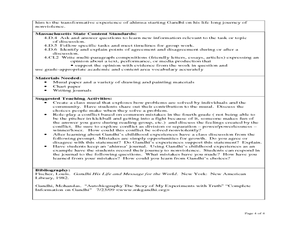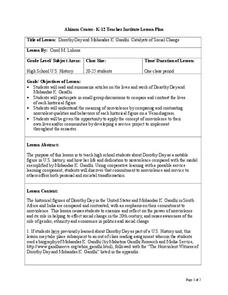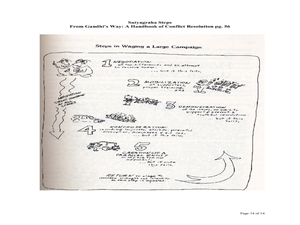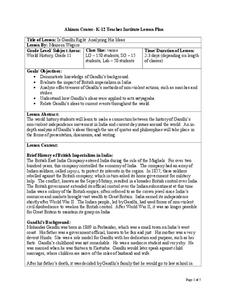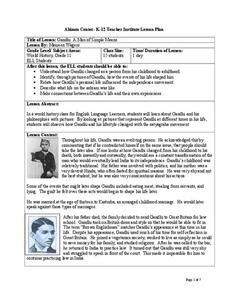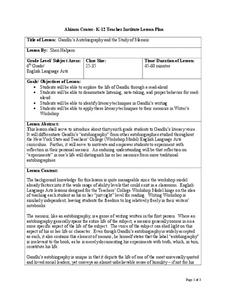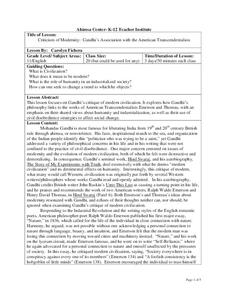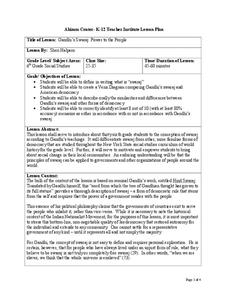Curated OER
Selfless Service and The Giving Tree - Building Ethical Conscience
Upper elementary schoolers investigate philanthropy and selflessness by reading a children's book. In this ethics lesson, they read The Giving Tree by Shel Silverstein, and research Mahatma Gandhi's troublesome, yet inspiring, life....
Curated OER
Applying Ahimsa to Traditional Stories
Investigate the life of Mahatma Gandhi by researching non-violent lifestyles. Learners define the word ahimsa and discuss the personal characteristics that made Gandhi a peaceful warrior. They also create a poster about the story "The...
Curated OER
Gandhi's Childhood Experience of Truth and Nonviolence
Fourth graders investigate philosophy by researching the life of Mahatma Gandhi. In this historical biography lesson, 4th graders examine the peaceful philosophy of India's most famous resident. Students participate in role-playing...
Curated OER
The Roots of Ahimsa
Students investigate the philosophy of nonviolence. In this Ghandi lesson, students discover that Gandhi inspired many civil rights leaders with the idea of ahimsa. Students complete venn diagrams, create timelines, and discuss...
Curated OER
The Making of the Mahatma: Gandhi's Childhood
Students investigate the childhood of one of the greatest philosophers of our time, Gandhi. In this biography lesson, students analyze the upbringing and events that finally shaped Mahatma Gandhi's life. Students locate...
Curated OER
Unit on Gandhi and Ahimsa
Students explore the history of Gandhi and his viewpoint and example of nonviolence. In this World History lesson, students complete numerous research assignments and activities over the course of nine lessons to expand their...
Curated OER
Dorothy Day and Mohandas K. Gandhi: Catalysts of Social Change
High schoolers explore how Dorothy Day and Mohandas Gandhi were leaders for social change. In this history lesson, students analyze the impact of these two leaders through several activities and group assignments.
Curated OER
Integrating Gandhian Principles of Communal Unity in Mathematics
Fourth through sixth graders incorporate Gandhian principles into Math curriculum. They explore Gandhi's teachings on communal unity and economic equality. This has quite a bit of information about Gandhi and his observations and...
Curated OER
The Way You Dream: Gandhi and King's Visions of Nonviolence
Students read Gandhi and Dr. King's messages about nonviolence and discuss their visions about loving one's enemies. In this nonviolence lesson plan, students read Gandhi's "Ahimsa, or the Way of Nonviolence" and Dr. Martin Luther King's...
Curated OER
What is the Essential Gandhi?
Seventh graders explore the essence of Gandhi's teachings. In this nonviolent protest lesson, 7th graders select service projects based on the teachings of Gandhi.
Curated OER
Rev. Dr Martin Luther King, Jr. meets the Philosophy of Gandhi's Ahimsa
Students study Gandhi's and Dr. King's philosophies. In this world history lesson, students compare and contrast the methods by Gandi and Dr. King writing an essay on nonviolence.
Curated OER
Gandhi's Non-violent Revolutions: Examining Tools to Make Non-violent
Students analyze Gandhi's philosophy of nonviolent social change. In this nonviolence and social change lesson, students research a leader from the attached list who practiced nonviolent social change. Students write their own poem...
Curated OER
Tracing the Idea of Civil Disobedience through Thoreau, Gandhi, and King
Students analyze civil disobedience through history studying Thoreau, Gandhi, and Dr. King. In this civil disobedience lesson, students read and analyze excerpts from Thoreau, Gandhi, and Martin Luther King. Students demonstrate their...
Curated OER
Ahimsa as a Moral Force
Students explore the concept of Ahimsa. In this peace and tolerance lesson, students discuss Gandhi's application of Ahimsa and Satyagrah as they view the motion picture titled, "Gandhi." Students also discuss how effective Gandhi's...
Curated OER
Ahimsa in Writers Workshop
Students investigate nonviolent lifestyles by researching the life of Gandhi. In this journalism lesson, students define the word ahimsa and how important nonviolence is when solving conflicts. Students create a timeline of...
Curated OER
Is Gandhi Right: Analyzing His Ideas
Students explore the connection between Gandhi and the Independence Movement in India. For this lesson on social change, students examine the ideas of Gandhi to analyze non violent change. Students consider the impact of British...
Curated OER
Gandhi: A Man of Simple Means
Eleventh graders examine the life of Mohandas Gandhi. In this Gandhi instructional activity, 11th graders listen to their instructor present a lecture regarding the details of the Gandhi's life and respond to the provided discussion...
Curated OER
Gandhi's Autobiography and the Study of Memoir
Seventh graders explore the life of Gandhi using his autobiography and memoir. In this Gandhi exploration lesson plan, 7th graders analyze Gandhi's literary voice by reading his autobiography. Students identify literary techniques in...
Curated OER
Criticism of Modernity: Gandhi's Association with the American Transcendentalists
Eleventh graders explore Gandhi's philosophy links to the works of American Transcendentalists Emerson and Thoreau. In this transcendentalism instructional activity, 11th graders discuss essential questions about civilization...
Curated OER
Gandhi's Swaraj: Power to the People
Sixth graders discover what a swaraj is. In this world history instructional activity, 6th graders create a Venn Diagram comparing Gandhi's swaraj to American's democracy.
Curated OER
Gandhi's Life and Guiding Principles
Second graders investigate philosophy by researching the life of Mahatma Gandhi. In this biographical lesson, 2nd graders listen to a reading of the book "Gandhi" and make a character map of his actions, feelings and thoughts....
Curated OER
Non-Violence Means "Doing Nothing"
Students reflect on violence and non-violence. In this World History lesson, students read an article by Gandhi then write an essay as to whether they agree or disagree with his thoughts. Students then share all their ideas...
Curated OER
Free India: Resisting British Rule in India
Students explore the impact of nonviolence during Gandhi's Free India movement. In this World History lesson, students complete several activities including research, class discussions and a multimedia project, all centered around...
Curated OER
Gandhi's "Good Life"
Eleventh graders use a Gandhian lens to analyze critically materialism in a capitalist society. In this Gandhian philosophy lesson plan, 11th graders cultivate awareness, explore materialism and sustainability, examine the idea of 'what...




